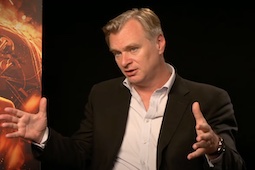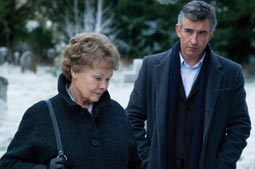
Hijacking drama Captain Phillips is making waves at the UK box office, having grossed an impressive £7.89m so far. The man whose story inspired the film, Richard Phillips, talks to Steven Goldman about the movie and his experiences.
Not yet seen Captain Phillips? Click here to book your tickets.

Captain Phillips, what was it like for you to watch your own story unfold on screen?
You know it’s really something that I put behind me. I closed that door. But watching the movie there were times that it really brought it back to me. It showed the tension and the stress very well. When I would look into Tom Hanks’ eyes, especially when the pirates come aboard, to see the fear and how he tries to regain a little control… I thought they did a very good job portraying the stress of it.
Was it difficult for you to watch it?
No it really wasn’t. I was more or less looking at it, hoping that it would be a good movie, and it was. I think they portrayed my crew well and the merchant marine in general.
How well does the movie capture your story?
I think it does a very good job. I think Paul Greengrass boiled the story down to its [core]… It’s a story of peril on the sea and I think he did a very good job portraying it. They definitely got the stress, the tension and even the closeness in the lifeboat… I think they did a good job.
You wrote a book about your experience [A Captain's Duty: Somali Pirates, Navy SEALS, and Dangerous Days at Sea]. How and why did that come about?
There was a demand when I came back. I was really ignorant of all the media maelstrom. I can still remember being in the boat and just sitting there thinking, “Richard you’re in a lot of trouble here. You’ve got four knuckleheads with guns on you and nobody knows you’re out here.” You know I didn’t realize… I guess I was a little naïve of the media maelstrom that was going on around me. So when I got home it was very surprising. And then, even more surprising, getting all these requests, letters, telephone calls, emails – just interest in the story. I guess it did touch a lot of people and so the interest was there.
What input did you have on the making of the film?
In the beginning I talked to [screenwriter] Billy Ray. He did multiple [drafts] – he’d get back and forth to me on various things. He sent me a few sections of the script. And then the prop people were very involved. A lot of phone calls. “What kind of glasses? What kind of rings? What kind of trousers? What kind of watch?” You know, that sort of thing. Then later, Tom Hanks came up three times to my house in Vermont. We talked for two to five hours depending on the visit. He knew the story. He’d read the book. But he just wanted to meet me and ask some questions about the routine at sea, the routine of going back and forth from work to sea, with me being on a ship and away for three months at a time… He’d also ask about some nomenclature - the language we speak on the ships...
What was it like having Tom Hanks come to your house?
(Laughs)… He was a pretty straightforward guy. You know, he walked in the door. It was actually during March Madness (the US national college basketball tournament). So he says, “Ok let’s just go and get this over with. I’m Tom Hanks… Go ahead and take a picture.” (Laughs)… The basketball game was still on so I said, “As soon as the game’s over we’ll talk.” My daughter was talking to him – “I loved you in Toy Story.” And he goes playfully, “Yeah I get that a lot.” (Laughs)… He’s a pretty regular, down to earth guy and I guess that enables him to play all those roles he does so well. No airs about him. No entourage behind him. A pretty good guy.
What did you think of his performance?
He did a very good job. Again, when it first starts and the pirates are on the bridge… You know, to me, in his eyes, I could see something that brings me back. I can see the fear. I can see the cogs of the brain moving to try and figure out a way to regain some control, no matter how small… He did a very good job.
Did you visit the set?
I only visited one of the sets and that was the one in Massachusetts.
What was it like meeting director Paul Greengrass?
He’s another good guy. You know, he doesn’t take himself seriously, but he takes his work very seriously.
What kind of input did you give him?
Before the movie was made there were emails and telephone calls back and forth. I don’t know if you know, but his father is a merchant-mariner. So it was something close for him to do this movie too. But yeah, there were telephone calls back and forth. Again, it was more before the shooting, so it was more in terms of the script – “Would this happen? Would that happen? Could this have been said?” Things like that.
Watching the film I was surprised that a small group of men could capture a ship of that size… How could they succeed?
And why was no one on the ship armed at the time? That ship was the first ship I’d ever been on that wasn’t armed… On other ships I’ve had multiple weapons. But on that ship there were no weapons… The other thing, as far as a small boat… The best correlation I can give of that is the cave men with the mastodons. How did they take them down? Also one of the big things in these pirate incidents is really the weather. That morning, before it all started, it was calm. There was very little swell running. The seas were very slight. There was hardly any wind. That’s the biggest thing with a boarding or a piracy incident like that. The weather is incredibly important if they’re going to be successful.

Have security procedures changed as a result of this attack?
I don’t think they changed as much as everyone gave them new thought. And it really brought it to the forefront. I think now people are looking at it… observing, checking and inspecting. I think that increased after my incident… A lot of people don’t realize that we fight piracy all over the world. Even today we fight it in the Malacca Straits, Indonesia, Java, the East and West coast of Africa, and the East and West coast of South America. So it’s something that… I think it just brought it to the forefront and by doing that, it really got people thinking about it and instituting some changes on their individual ships.
Is the security situation better than it was in 2009?
Boats have been taken, but no ships in over 14 months... Coalition forces, multiple nations’ naval forces are in the area now, more than there were before. Ships are hardening themselves. There are armed security teams on a lot of the proactive countries’ [ships]. And that has a lot to do with it… I don’t think it’s a silver bullet and it doesn’t mean it won’t happen with them, but that right there is one recourse that was seen and that is different…
You returned to work 14 months after the incident itself? How difficult was that for you?
It was pretty easy. At that time, four years ago, I was going to sea for thirty years. It’s what I do. In actuality that’s the longest I’ve been in one place, for that 14 months at home, straight… For me it was good to get back to what I know. I wasn’t afraid. I was wary, as I was even before the incident, of any areas. We fight piracy in other areas and there are also other things to worry about on a ship. But you can’t really be afraid. You have to be wary, observe and note. But when I got back to sea, it actually felt good to get back to what I know and to my normal.
What do you hope audiences take away from the movie?
I’m a regular guy. I’m not a hero. I’m not highly intelligent or brave or any of that. I’m just a regular guy. But you know we are all stronger than even we know. We don’t realize how much we can do and accomplish, because we are stronger [than we think]. The other thing is if we refuse to give up we can get over a lot of our problems. Those would be the two things and I think the film does a very good job of showing that.











.jpg)


.jpg)
.png)






